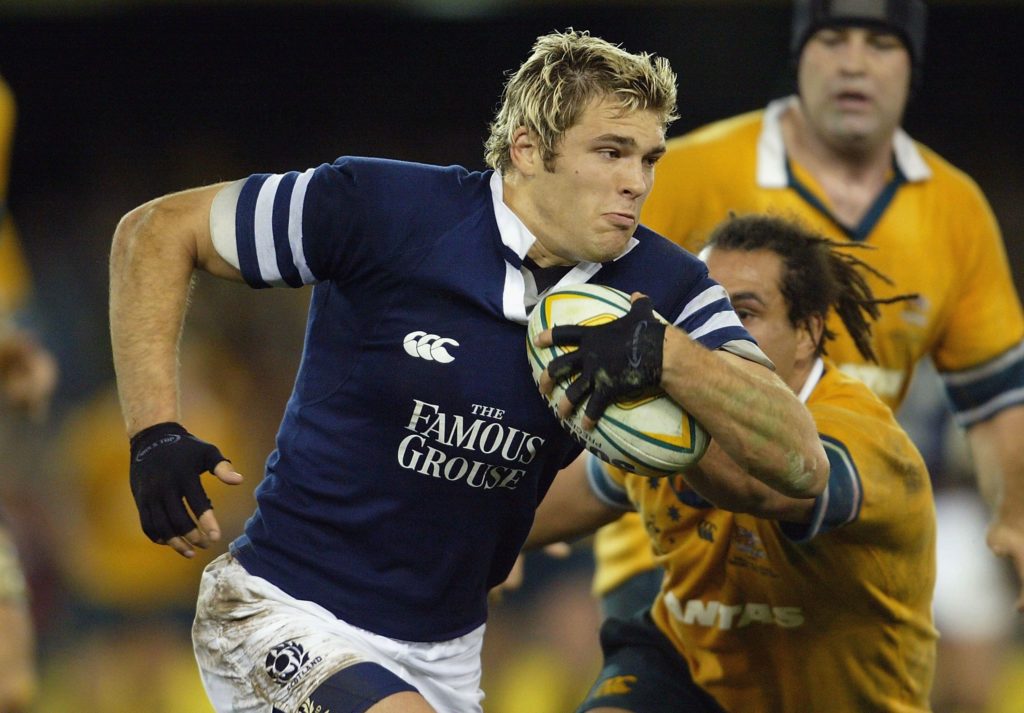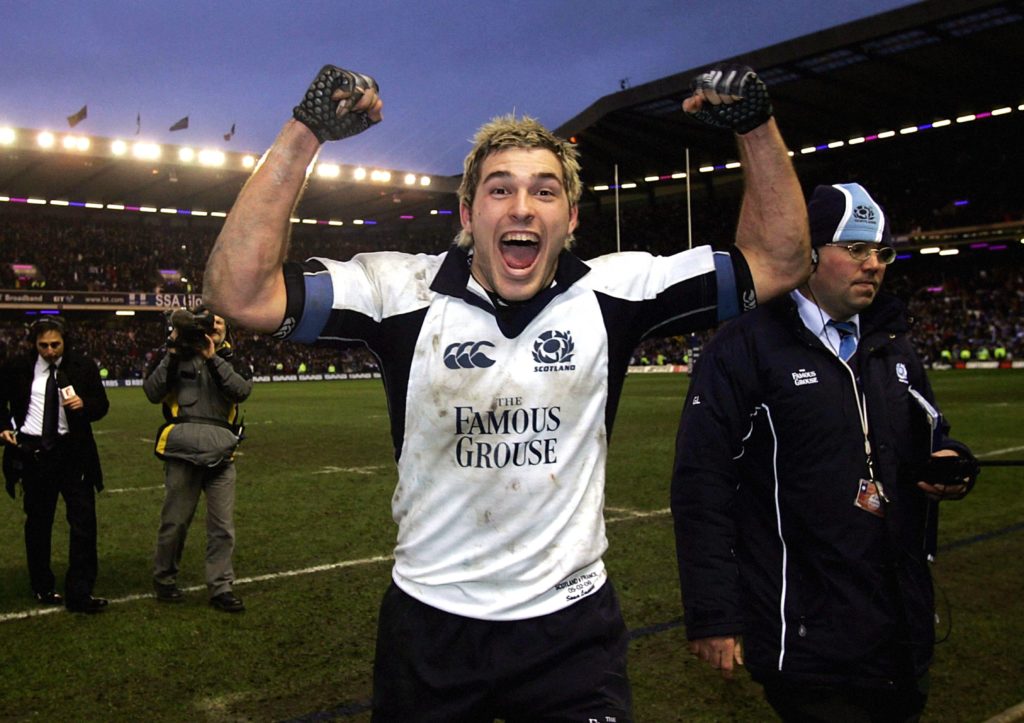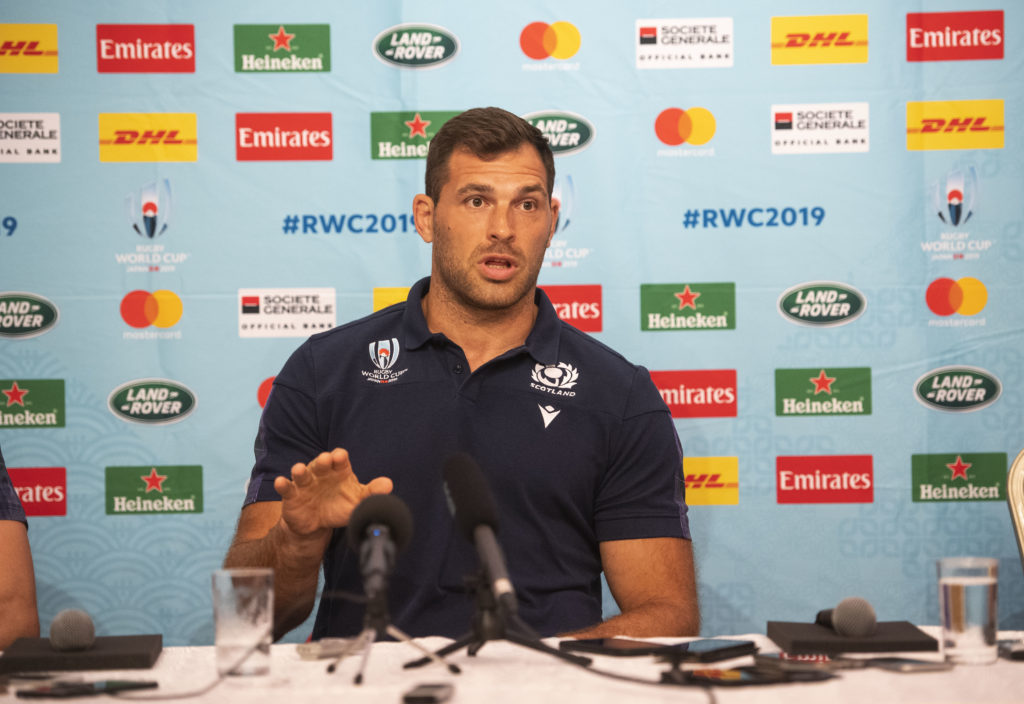After winning his 100th cap, Sean Lamont felt he deserved a present, a little treat to recognise his status as just the second Scotsman to play a century of Test matches.
A motoring enthusiast, the wing bought himself a dazzling Ford Mustang Coupe, scarlet-red and screaming American muscle. He loved the roar of its V8 engine. He revelled in getting his hands oily in its bowels. He savoured the absence of any electronic add-ons that are standard fare in modern automobiles. Nearly six years later, though, the treasured car sits dormant in the Lamont garage.
“I’ve driven it twice, and twice it broke down on me,” he tells the Rugby Centurions Podcast.
“I’ve pulled the engine out myself. I’m trying to rebuild it. I’ve seen plenty of YouTube videos and thought, ‘I can do this, this will take half an hour’. Six days later – years later – it’s still in the same bloody state out there.
“It’s driven nowhere. But I think it’s the classic Scotsman – I will not pay somebody else to do it when I can do it myself.”
I remember thinking, yeah, I’m gonna score a try on my debut and I got held up over the line!
Sean Lamont
Just as well, then, that Lamont’s durability on the field far surpassed the Mustang’s on the asphalt. In fact, in this era of bludgeoning and brawn, as the game developed and grew faster and harder, the back continued to thrive. Playing as a wing or centre, Lamont began his professional career at Rotherham, and turned out for Northampton Saints and Scarlets either side of two long spells with Glasgow Warriors, where he brought down the curtain on his career four years ago at the age of 36. He now works with Scottish Rugby as the Scotland Sevens’ team manager and strength and conditioning coach.
Lamont made his Scotland debut against Samoa in 2004, when Matt Williams’ brief and ill-fated reign began with a tour of Oceania.
“That is probably the one game I remember quite well because it was a dream come true. I was only involved in the one game before that against the Reds, and obviously proved my worth. I remember thinking, yeah, I’m gonna score a try on my debut and I got held up over the line!

“That kind of set the tone for my strike rate for Scotland – I think 14 in over 100 caps is an absolutely fantastic rating!
“But yeah, it was an absolute honour. I remember when the team was announced I was shaking. A few of us got capped around the same time, Graeme Morrison and Hugo Southwell.”
In those days, Lamont sported a shock of peroxide-blonde hair, partly dyed on a whim, partly a premeditated ploy to catch the eye of scouts and coaches.
“I had it at the Melrose Sevens the year I got picked up for Scotland Sevens,” he says. “It was, excuse the French, piss-yellow colour because it was a home job so it was not done at all well.
We were worried for him at one point. When he played he was around 98KG and he got down to 78KG at his lightest and looked ill with it, wasn’t eating properly
Sean Lamont
“This stupid yellow hair seemed to stand out quite well and I’m sure other people were playing as well as me, but the yellow hair was one of those things that just got you highlighted, no pun intended, and I just sort of kept it. I thought, it works for me, and then the press were saying ‘blonde bombshell’ and all this nonsense, so I’ll keep it. It can be a little trademark and I’ll run with it!”
The striking barnet did not only attract attention from selectors. When Lamont blasted over for two tries in Scotland’s win over France in 2006, then-Stade Francais president Max Guazzini was watching.
“I got a phone call from my agent saying Max Guazzini had spoken to him. Guazzini was the guy behind the Dieux du Stade naked calendar and he’d asked if I wanted to do it.
“I said yeah because it’s quite a big publication, I was still relatively up-and-coming two years after breaking through, it might help my profile, and getting naked was never, ever an issue. Singing, I absolutely hated, public speaking, I absolutely hated, but getting naked, I can deal with that.

“Clothes off is semi artistic, I think, high-quality photos. They had a good photographer, lot of airbrushing.”
Amidst the joy and tomfoolery was alarm, too. Lamont’s younger brother Rory, two years his junior, has endured a long battle with mental illness. Rory was forced to retire through injury in 2013, and spoke bravely and frighteningly about the player welfare standards of the time, the attitudes of coaches towards injured players, and the inadequacies of concussion protocols.
“We were worried for him at one point. When he played he was around 98KG and he got down to 78KG at his lightest and looked ill with it, wasn’t eating properly. He was really struggling after retirement. Between injury and losing his contract, things get out of control and he didn’t know how to stop. He realised he got quite isolated and wouldn’t interact with people very much.
“He is much better now which is a good thing. But it just took a lot of time for him to overcome that depression, get some perspective in life. Because the rugby is all-consuming, that’s gone, then you try to find another focus. You threw yourself wholeheartedly into sport, both physically and mentally, and when that is severed, it can become tough.”
There was tumult on the field, too. Say the name Craig Joubert to any Scotland supporter, and they will likely break out in hives. In 2015, on Lamont’s 101st cap, Joubert incorrectly awarded Australia a match-winning penalty that took them to the World Cup semi-final. The referee ran from the field at full-time to avoid any unseemly confrontation with the Scottish players.
“I would have rather been absolutely destroyed by Australia 50-0 at that point because then it shows we did not deserve to carry on, but to have a big hoo-ha which takes away from a little bit of our achievement,” Lamont says.
I don’t miss fighting for contracts, people telling you that you’re crap, social media, all that sort of stuff. And the big one is waking up on Sunday morning feeling like you’ve been hit by a bus
Sean Lamont
“The boys played bloody well in that game, could have made something really special. The one thing that really pisses me off – I can forgive people for making mistakes, but it’s the fact that he ran away off the pitch. For me, that means, you know you’ve made a mistake and you’re getting the hell out of there.
“I think the boys have ribbed him since whenever I come across him, but yeah, it’s just devastating, and to go out in that way with what could have been.”
In the end, Lamont won four more caps, and played for a couple more seasons at Glasgow. He was a tireless soldier for clubs and country, but particularly Scotland. He never refused the call; he was always there when needed. He never retired from international duty.
In the twilight of his playing career, he realised he had little idea of what to do next, but in strength and conditioning, found an area of passion and an avenue to remain in the game. He worked with academy players, and assisted the national team at the 2019 World Cup, before taking on his sevens role. In Lamont’s view, it is a fitting nod to his past and an embracing of the future.

“If sevens could have paid like XVs, I 100% would have stayed a sevens player. But could you make a career of it? I loved the sevens. It’s always going to have that sweet spot in the heart because it was that that launchpad for my career, and especially as a fast back, having that open space and the challenges.
“But it is such an isolating sport, if you don’t have good enough skills, either in passing or defence, you get shown up and there are some rapid boys out there especially now. I mean, guys now compared to when I started, they are so much fitter.
“There are parts of rugby when I was close to retiring that I hated. There are parts of it I loved and still love today. I don’t miss fighting for contracts, people telling you that you’re crap, social media, all that sort of stuff. And the big one is waking up on Sunday morning feeling like you’ve been hit by a bus.
“You are absolutely battered and you’ve got to get up and do it all again. When you’re young, it’s pretty easy. As I got older, I’d play on Saturday, and it would be Friday and I’d still be feeling like I’d been hit by the bus. But if I got asked to do it again, I still would… still would.”
If you’ve enjoyed this article, please share it with friends or on social media. We rely solely on new subscribers to fund high-quality journalism and appreciate you sharing this so we can continue to grow, produce more quality content and support our writers.


Comments
Join free and tell us what you really think!
Sign up for free